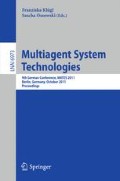Abstract
The increase of road users and traffic load has lead to the situation that in some regions road capacities appear to be exceeded regularly. Although there is natural capacity limit of roads, there exist potentials for a dynamic adaptation of road usage. Finding out about useful rules for dynamic adaptations of traffic rules is a costly and time consuming effort if performed in the real world. In this paper, we introduce an agent-based traffic simulation model and present an approach to learning dynamic adaptation rules in traffic scenarios based on supervised learning from simulation data. For evaluation, we apply our approach to synthetic traffic scenarios. Initial results show the feasibility of the approach and indicate that learned dynamic adaptation strategies can lead to an improvement w.r.t. the average velocity in our scenarios.
Access this chapter
Tax calculation will be finalised at checkout
Purchases are for personal use only
Preview
Unable to display preview. Download preview PDF.
References
Baqueiro, O., Wang, Y.J., McBurney, P., Coenen, F.: Integrating data mining and agent based modeling and simulation. In: Perner, P. (ed.) ICDM 2009. LNCS, vol. 5633, pp. 220–231. Springer, Heidelberg (2009)
Bazzan, A.L.C.: Opportunities for multiagent systems and multiagent reinforcement learning in traffic control. Autonomous Agents and Multi-Agent Systems 18, 342–375 (2009)
Bazzan, A.L.C., de Oliveira, D., Klügl, F., Nagel, K.: To adapt or not to adapt – consequences of adapting driver and traffic light agents. In: Tuyls, K., Nowe, A., Guessoum, Z., Kudenko, D. (eds.) ALAMAS 2005, ALAMAS 2006, and ALAMAS 2007. LNCS (LNAI), vol. 4865, pp. 1–14. Springer, Heidelberg (2008)
Bull, L., Sha’Aban, J., Tomlinson, A., Addison, J., Heydecker, B.: Towards distributed adaptive control for road traffic junction signals using learning classifier systems, pp. 279–299. Springer, New York (2004)
Dallmeyer, J., Lattner, A.D., Timm, I.J.: From GIS to Mixed Traffic Simulation in Urban Scenarios. In: Proceedings of the 4th International ICST Conference on Simulation Tools and Techniques (SIMUTools 2011) (2011)
Fiosins, M., Fiosina, J., Müller, J.P.: Change point analysis for intelligent agents in city traffic. In: The Seventh International Workshop on Agents and Data Mining Interaction (ADMI 2011) at the 10th International Conference on Autonomous Agents and Multiagent Systems (AAMAS 2011), Springer, Heidelberg (2011)
Gehrke, J.D., Wojtusiak, J.: Traffic prediction for agent route planning. In: Proceedings of the 8th International Conference on ComputationalScience, Part III, ICCS 2008, pp. 692–701. Springer, Heidelberg (2008)
Hafstein, S.F., Pottmeier, A., Wahle, J., Schreckenberg, M.: Cellular automaton modeling of the autobahn traffic in north rhine-westphalia. In: Troch, I., Breitenecker, F. (eds.) Proc. of the 4th MATHMOD, pp. 1322–1331 (2003)
Hall, M., Frank, E., Holmes, G., Pfahringer, B., Reutemann, P., Witten, I.H.: The WEKA data mining software: An update. SIGKDD Explorations 11(1), 10–18 (2009)
Helbing, D.: Empirical traffic data and their implications for traffic modeling. Phys. Rev. E 55(1), R25–R28 (1997)
Kerner, B.S.: Introduction to Modern Traffic Flow Theory and Control: The Long Road to Three-Phase Traffic Theory. Springer, Heidelberg (2009)
Moussa, N.: Car accidents in cellular automata models for one-lane traffic flow. Phys. Rev. E 68(3), 36127 (2003)
Nagel, K., Schreckenberg, M.: A cellular automaton model for freeway traffic. Journal de Physique I 2(12), 2221–2229 (1992)
Nagel, K., Wolf, D.E., Wagner, P., Simon, P.: Two-lane traffic rules for cellular automata: A systematic approach. Physical Review E 58(2), 1425–1437 (1998)
Quinlan, J.R.: C4.5 - Programs for Machine Learning. Morgan Kaufmann Publishers, Inc., San Francisco (1993)
Stevanovic, A.: Adaptive Traffic Control Systems: Domestic and Foreign State of Practice (NCHRP Synthesis 403, Transportation Research Board). National Academy of Sciences, Washington D.C (2010)
Author information
Authors and Affiliations
Editor information
Editors and Affiliations
Rights and permissions
Copyright information
© 2011 Springer-Verlag Berlin Heidelberg
About this paper
Cite this paper
Lattner, A.D., Dallmeyer, J., Timm, I.J. (2011). Learning Dynamic Adaptation Strategies in Agent-Based Traffic Simulation Experiments. In: Klügl, F., Ossowski, S. (eds) Multiagent System Technologies. MATES 2011. Lecture Notes in Computer Science(), vol 6973. Springer, Berlin, Heidelberg. https://doi.org/10.1007/978-3-642-24603-6_9
Download citation
DOI: https://doi.org/10.1007/978-3-642-24603-6_9
Publisher Name: Springer, Berlin, Heidelberg
Print ISBN: 978-3-642-24602-9
Online ISBN: 978-3-642-24603-6
eBook Packages: Computer ScienceComputer Science (R0)

